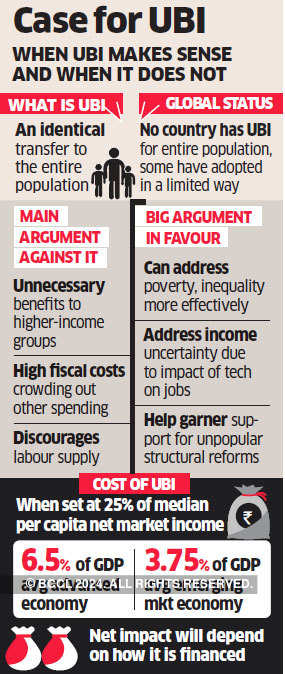India could provide universal basic income of Rs 2,600 a year: IMF
ET Bureau|
Updated: Oct 12, 2017, 01.47 AM IST

NEW DELHI: The International Monetary Fund (IMF) estimates India could provide a universal basic income (UBI) of Rs 2,600 a year to every person if it eliminates food and energy subsidies.
In its ‘Fiscal Monitor – Tackling Inequality’, the IMF has discussed UBI, “a proposal that has been widely debated recently and is being tested in several countries”, devoting extensive space to its case for India.
The calculations are based on 2011-12 data and would therefore need to be adjusted for sharp decline in fuel subsidies under the NDA government and better targeting of other subsidies through Aadhaar that has reduced overall subsidies.
Even such a modest level of UBI will incur a fiscal cost of about 3% of GDP, but would outperform the public food distribution and fuel subsidies on three counts.
It will address the under coverage of the near 20% lower income groups in the PDS, address the issue of higher income groups cornering bigger subsidies and increase generosity benefits received by the lower income groups.

The IMF has acknowledged the growing debate on the need for subsidy reforms while assessing the case for UBI. “Part of the policy debate has focused on the potential role of a universal basic income (UBI) as an alternative to the existing system of state subsidies, which are typically characterized as fraught with inefficiencies and inequities,” it said.
The figure of Rs 2,600 per annum has been arrived at through simulation that replaces food and fuel subsidies in India with a UBI.
In case of fuel subsidies, the IMF simulation goes beyond budget subsidy of cost-price difference to the extent prices are “below efficient levels that would internalize the negative externalities associated with fossil fuel consumption”.
The flip side of this is that eliminating the wider subsidies would require a sharper increase in prices than the case when budget subsidies are removed. The IMF cites a 2016 study that pegs the order of increase at gasoline (67%), diesel (69%), kerosene (10%), LPG (94%) and coal (455%).
“These large price increases reflect a broad definition of ‘tax subsidies’ that reflects the environmental cost associated with fossil fuel consumption,” the report said.
In its ‘Fiscal Monitor – Tackling Inequality’, the IMF has discussed UBI, “a proposal that has been widely debated recently and is being tested in several countries”, devoting extensive space to its case for India.
The calculations are based on 2011-12 data and would therefore need to be adjusted for sharp decline in fuel subsidies under the NDA government and better targeting of other subsidies through Aadhaar that has reduced overall subsidies.
Even such a modest level of UBI will incur a fiscal cost of about 3% of GDP, but would outperform the public food distribution and fuel subsidies on three counts.
It will address the under coverage of the near 20% lower income groups in the PDS, address the issue of higher income groups cornering bigger subsidies and increase generosity benefits received by the lower income groups.

The IMF has acknowledged the growing debate on the need for subsidy reforms while assessing the case for UBI. “Part of the policy debate has focused on the potential role of a universal basic income (UBI) as an alternative to the existing system of state subsidies, which are typically characterized as fraught with inefficiencies and inequities,” it said.
The figure of Rs 2,600 per annum has been arrived at through simulation that replaces food and fuel subsidies in India with a UBI.
In case of fuel subsidies, the IMF simulation goes beyond budget subsidy of cost-price difference to the extent prices are “below efficient levels that would internalize the negative externalities associated with fossil fuel consumption”.
The flip side of this is that eliminating the wider subsidies would require a sharper increase in prices than the case when budget subsidies are removed. The IMF cites a 2016 study that pegs the order of increase at gasoline (67%), diesel (69%), kerosene (10%), LPG (94%) and coal (455%).
“These large price increases reflect a broad definition of ‘tax subsidies’ that reflects the environmental cost associated with fossil fuel consumption,” the report said.







